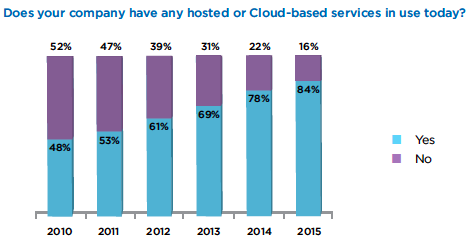This research project polled 250 IT decision-makers from a broad and representative cross section of industries and organisation size. It is the fifth annual UK cloud adoption survey commissioned by the Cloud Industry Forum.
Today, over four in five UK organisations have formally adopted at least one Cloud service, this report gives fascinating insight into satisfaction ratings with those services.

Cloud is certainly helping organisations meet their business objectives, with a significant proportion of Cloud adopters managing to reduce their capital expenditure, improve the reliability of their IT and reduce the risk of data loss.
This paper goes into detail on how many organisations are expecting to venture into Cloud for the first time this year, and for those already using it, how many expect to adopt more Cloud services over the next 12 months.
But what is clear is that Cloud isn’t “all things to all men” and that Cloud services and platforms will continue to sit alongside on-premise solutions for quite some time to come. Although penetration has increased year-on-year, and indeed, faster than anticipated, Cloud-based solutions still constitute a relatively small part of the wider IT estate and half of organisations expect to keep specific applications and services on-premise indefinitely. The report shows the percentage of organisations that will be maintaining Hybrid IT environments for the foreseeable future.

2015 promises to be a step change for Cloud with end of support for Windows Server 2003 and Microsoft Small Business Server 2003 in July, which will add a significant amount of momentum to the industry. This report shows worrying trends in relation to this issue. Even with the publicity surrounding the windows server 2003 deadline, the research shows worrying trends in relation to this issue. As the deadline approaches, we expect to see a significant proportion of these organisations take the opportunity to move their server workloads to Cloud, and are confident that this will result in a substantial increase in Cloud adoption for both new and existing users.
However, the challenge remains for the industry to establish what it is exactly that Cloud can offer end users and try to qualify and quantify it; what is the return on investment? This is, admittedly, no trivial task but is critical if the Cloud industry is to demonstrate its worth and counterbalance persistent and recurring Fear, Uncertainty and Doubt (FUD) in the media. Although much has been written about the potential cost savings when compared to on-premise solutions, these do not always materialise and the fact is that the benefits of Cloud do not always reveal themselves on the balance sheets. With this in mind, we have, for the first time, sought to demonstrate in detail both the tangible and intangible benefits experienced by organisations using Cloud services, and this line of questioning (detailed later in the report) has proved highly insightful.
This White Paper will seek to distil with clarity the business case for Cloud, provide insight as to how and why UK-based organisations are using Cloud services and offer analysis on the key trends currently taking hold in the UK Cloud industry.



